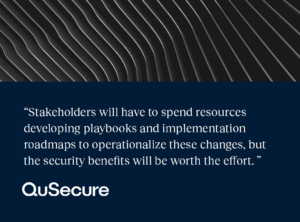QuSecure Honored as Global Product Leader in Post-Quantum Cryptography by Frost and Sullivan

Cygnus Business Media / The Free Library / 1 August 2023
Quantum computers, which are expected to become viable in the next several years, use subatomic particles and quantum mechanics to execute calculations faster than today’s highest-performing conventional supercomputers. This computing power comes with the ability to crack encryption methods that are based on factoring large prime numbers. An algorithm introduced by Peter Shor, back in 1994, provides a method for the factorization of large prime numbers in polynomial time instead of exponential time. While a conventional computer might take trillions of years to break a 2,048-bit asymmetric encryption key, a quantum computer powered by 4,099 quantum bits, or “qubits,” using Shor’s algorithm would need about 10 seconds to accomplish the task.
This powerful decryption capability will wreak havoc on national security and secure computing in general. Right now, we rely on cryptography to maintain data confidentiality and integrity, two of the three legs of the information security triad. The third leg, availability, could also collapse as the encryption that protects systems management tools similarly breaks under quantum attacks.
It is shortsighted to think that because cryptographically relevant quantum computers (CRQCs) don’t exist yet, there is nothing to worry about today. This idea is gravely mistaken. Quantum is coming at a faster pace than anyone previously contemplated and malicious actors can steal encrypted data today and decrypt it with quantum later. For example, cryptocurrencies and banking accounts are vulnerable right now. Your Ethereum wallet uses a semi-permanent public key that is published on the blockchain for token exchanges. Older wallets on the Bitcoin blockchain use a permanent public key for security. Banks use a similar public key exchange to validate your account access. Once quantum computers come online, a bad actor can discover the private keys associated with these public keys, and the contents of wallets and accounts will become available to the attacker. Now is the time to implement a quantum-resistant approach to cryptography to ensure data is protected now and into the future.
Read the full article from The Free Library here.